vendredi, 23 août 2024
Stand Watie, le Cherokee qui devint général confédéré
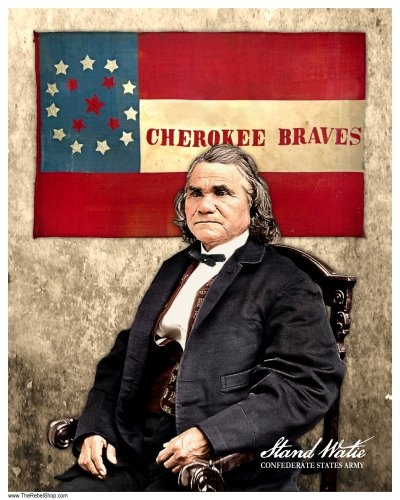
Stand Watie, le Cherokee qui devint général confédéré
par Emiliano Calemma
Source: https://www.destra.it/home/storie-damerica-stand-watie-il-cherokee-che-divenne-generale-confederato/
Stand Watie est un nom qui ne dit pas grand-chose aux lecteurs italiens, mais son histoire est pleine de charme et une grande partie de sa vie se lit comme un véritable roman d'aventures. Parmi les plus belles.
Stand Watie appartenait à la tribu amérindienne des Cherokee et son nom d'origine était De-ga-ta-ga (Il se tient debout). Il est né en 1806 et a été dès son plus jeune âge un indigène « à contre-courant ». Les Cherokees, une tribu originaire de Géorgie, se sont divisés en deux factions opposées lorsque le gouvernement fédéral, après la découverte de riches gisements d'or sur le territoire des Cherokees, a demandé aux indigènes de se déplacer plus à l'ouest. Watie pense que la seule solution pour éviter le massacre de son peuple est de signer un traité et de se déplacer pacifiquement vers l'ouest, sur le territoire de l'actuel Oklahoma. La faction adverse, dirigée par John Ross, s'oppose à tout accord et jure de se venger de Watie. Ce dernier s'installe à l'ouest en 1837 avec une partie de la population cherokee, tandis que Ross reste dans les territoires d'origine. C'est un désastre. En 1838, l'armée fédérale entreprend l'expulsion forcée de Ross et de son peuple et sur les 15.000 Cherokees qui se mettent en route, 4000 meurent (le chemin parcouru s'appellera la « Piste des larmes »).
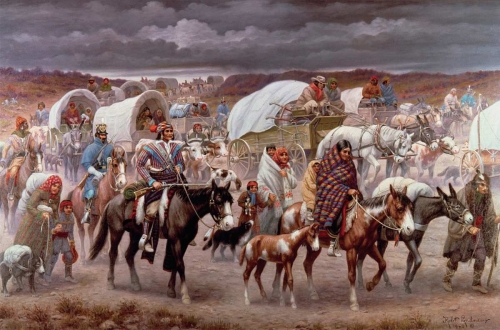
Ross, qui a perdu sa femme lors de la traversée vers l'ouest, au lieu de rendre le gouvernement fédéral responsable de la tragédie, se retourne contre la famille Watie et c'est le frère, le cousin et l'oncle de Stand qui en pâtissent. Ce dernier devient alors un ennemi acharné de la faction Ross (pour des raisons personnelles évidentes) et du gouvernement fédéral (coupable d'avoir massacré les Cherokee malgré un accord spécifique). Il devient alors un leader politique reconnu au sein du Conseil tribal entre 1845 et 1861.
En 1861, lors du déclenchement de la fameuse guerre de sécession américaine, Stand Watie décide de se ranger du côté des États confédérés, déclarant que le véritable ennemi des indigènes est le gouvernement fédéral et non les États du Sud. De nombreuses autres tribus firent le même choix et l'armée confédérée put ainsi compter sur le soutien de la plupart des peuples Cherokee, Choctaw, Chickasaw, Seminole, Catawba et Creek.
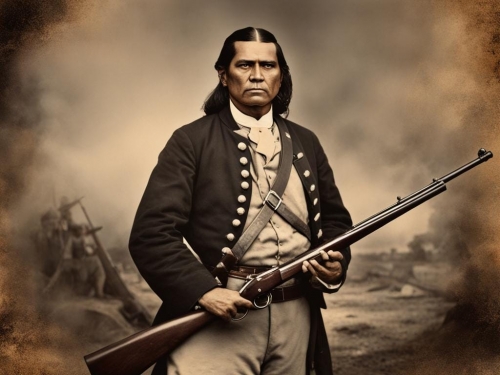
Stand Watie crée le premier régiment d'indigènes, les Cherokee Mounted Rifles, et assure dans un premier temps le contrôle des territoires indiens qui font partie de la Confédération, en garantissant l'ordre et la vigilance. Il est nommé colonel le 12 juillet 1861 et est élu chef de tous les Cherokees en 1862. Par la suite, il se distingue comme un vaillant commandant de terrain, doué d'une intelligence tactique et d'une grande audace. En mars 1862, lors de la bataille de Pea Ridge (Arkansas), alors que l'armée confédérée décide de battre en retraite, les hommes commandés par Watie capturent tout un bataillon d'artillerie de l'Union. De succès en succès, Watie devient général de brigade et est l'un des plus féroces combattants de l'armée confédérée. Ses troupes participent à 18 batailles et à d'innombrables affrontements armés, dont elles sortent presque toujours victorieuses.
Watie gagne le respect de tous les autres généraux par ses exploits : la capture du bateau à vapeur JR Williams et celle du convoi ferroviaire à Cabin Creek restent inoubliables aux États-Unis. Watie a tellement épousé la cause confédérée qu'il a refusé de reconnaître la victoire de l'Union et a maintenu ses troupes sur le champ de bataille pendant plus d'un mois, alors que le général Edmund Kirby Smith s'était déjà rendu à l'armée de l'Union.

Malgré la capitulation finale signée par le général Lee à Appomattox, Watie fut le dernier général confédéré à déposer les armes, 75 jours après la signature.
À la fin de la guerre, Watie retourne dans son territoire indien et reconstruit son ancienne maison, que le gouvernement fédéral avait rasée en signe de disgrâce. Son dernier acte public fut de représenter les Cherokees du Sud lors des négociations du traité de reconstruction des Cherokees en 1866. Il n'y avait cependant pas grand-chose à négocier. Le nouveau gouvernement des États-Unis dépouille les Cherokees de toutes leurs possessions en échange de leur réadmission dans l'Union sans autre conséquence.
Stand Watie est mort dans sa maison de Honey Creek en 1871.
20:35 Publié dans Histoire | Lien permanent | Commentaires (0) | Tags : histoire, états-unis, cherokee, stand watie, confédérés, guerre de sécession |  |
|  del.icio.us |
del.icio.us |  |
|  Digg |
Digg | ![]() Facebook
Facebook
samedi, 19 août 2017
The Austrian Empire and the Confederacy
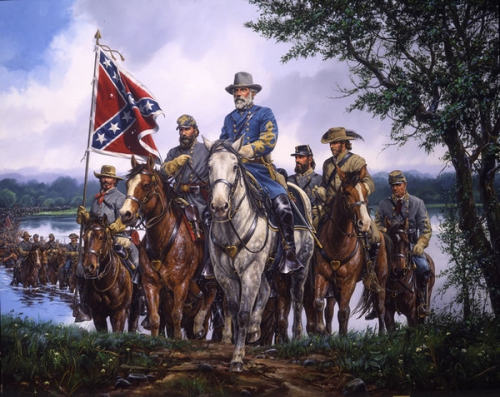
The Austrian Empire and the Confederacy
The northern states were also home to large numbers of European immigrants who had fled their countries after failed revolutionary movements, so there were many Irish republicans in the north who detested the British Empire and many liberal Germans who had fled in the aftermath of the Revolutions of 1848. The only ‘Great Power’ to be seen at least as supportive of the U.S. government was the Russian Empire and this was mostly due to the fact that Britain and France were seen as friendlier to the Confederacy and the Russians hoped to counter this such as when Russia sold Alaska to the United States in order to prevent it being added to Canada by the British in a potential future conflict. The Austrian Empire was not extremely concerned about events in America, having many pressing problems of their own to deal with at the time, but that is not to say that they were not interested at all. Although the Emperor of Austria, Francis Joseph, had opposed the whole adventure, his younger brother was Emperor of Mexico and thus his fate, and that of the Austrian volunteer corps sent to aid him in Mexico, also depended almost entirely on the Confederates winning their independence.
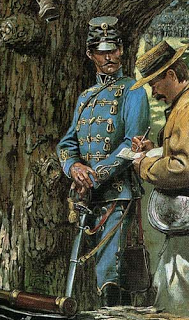
As also pointed out previously, the Confederacy was also greatly influenced by the style of the Austrian Empire. The uniforms of the Confederate army were inspired by those of the Austrian light infantry and the first Confederate national flag was inspired by the ensign of the Austrian Empire, both being designed by the Prussian artist Nicola Marschall. The Emperor of Austria also had his own “eyes on the ground” so to speak, in the person of Captain FitzGerald Ross, a British-born officer of the Sixth Austrian Hussar Regiment. He made quite a stir in the southern states with his waxed moustache and braided Hussar uniform, in fact he was almost mobbed by admirers after being persuaded by some Confederate officers to wear his full dress uniform, fur busby, dolman and all, for a ride with them. He witness the Battle of Gettysburg, then went to Richmond, Charleston and then Chattanooga, Tennessee where he observed the fight from the lines of the Confederate General Braxton Bragg. He also visited the Gulf coast, Mobile, Alabama and so on. Like many, he was very impressed by the Confederate military and, like many more, was also impressed by the southern ladies. He became an ardent Confederate sympathizer, even to the point of picking up a rifle and taking part in a battle during his long stay in the south. When Ross finally returned to Europe, no matter what bad news reached him, he remained confident that the south would ultimately win.
Such a thing would have, inadvertently, greatly expanded Austrian influence in the New World given that the establishment of a Habsburg monarchy in Mexico (or rather the ‘reestablishment’) would have given Austria a sort of foothold in the region. Confederate President Jefferson Davis was certainly aware of this and tried to enlist the Prussian observer, Captain Justus Scheibert, as an envoy to Emperor Napoleon III of France. He proposed a sort of Franco-Confederate alliance, pointing out that in the Mexican War (of which Davis was a noted veteran) the U.S. had defeated Mexico with only 12,000 men and that if Napoleon would lift the Union blockade of the southern coast, which Davis believed could be done with ‘the stroke of a pen’ and would ensure a Confederate victory, he would supply 20,000 Confederate troops to aid the Emperor Maximilian of Mexico, explaining that southern troops were adjusted to the climate and familiar with the fighting style of the Mexicans.
However, this, as we know, did not come to pass. Although tempted, none of the European powers ultimately were bold enough to risk war with the United States by recognizing the Confederacy (though Pope Pius IX did address a letter to Jefferson Davis as President of the C.S.A.). When the Confederacy fell, the effort to spread monarchy in the Americas quickly fell apart. The U.S. government dispatched an army to the south Texas border and warned the French to withdraw or face war. Napoleon, not wishing to see the enterprise be for nothing, hoped that the Austrian Empire would take up the French cause of supporting the Mexican imperialists. A further 2,000 Austrian volunteers (roughly) were assembled at the port of Trieste, ready to embark for Mexico and fight for Emperor Maximilian. It was, though, at that point that the Union government stepped in by way of U.S. Minister to Vienna John Lothrop Motley who went to the Hofburg and informed the Austrian Emperor quite bluntly that the U.S. recognized only Benito Juarez as the leader of the legitimate Mexican government and that if the Austrian troops were allowed to leave, the U.S. would consider the Austrian Empire to be at war with the Mexican Republic and the U.S. Navy would take retaliatory action on behalf of Mexico.
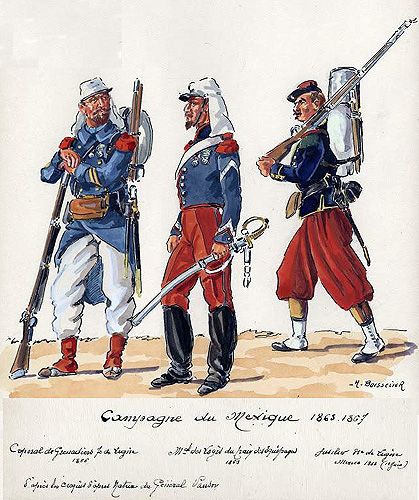
The expedition was thus canceled, the Austrian soldiers disbanded and the Austrian Volunteer Corps already fighting in Mexico was promptly recalled. Many had already been slaughtered at the Battle of Santa Gertrudis where, seeing which way the winds were blowing, their comrades of the Mexican Imperial Army had deserted in the middle of the battle to join the republicans. The surrender of General Lee at Appomattox Court House in 1865 had set the dominos to falling, the Austrians pulled out and shortly thereafter the Habsburg Emperor of Mexico was captured and shot, the Austrian Emperor then even having a difficult time retrieving the body of his slain younger brother. The Imperial House of Habsburg had had a presence in the Americas ever since Philip the Handsome and Charles V had held their Spanish crowns until the succession was taken up by the Bourbons of France. In 1864, however, another Habsburg returned to, he hoped, usher in a new era of monarchy in the Americas but with the fall of the Confederacy, it was inevitable that the Habsburgs would once again lose their place in the New World.
01:35 Publié dans Histoire | Lien permanent | Commentaires (0) | Tags : histoire, sudistes, confédération, confédérés, états-unis, guerre civile américaine, guerre de sécession, mexique, empire austro-hongrois |  |
|  del.icio.us |
del.icio.us |  |
|  Digg |
Digg | ![]() Facebook
Facebook
dimanche, 17 janvier 2010
Robert E. Lee and Stonewall Jackson were Anti-Slavery
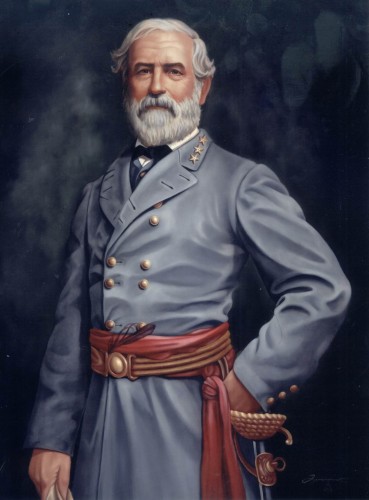
Robert E. Lee and Stonewall Jackson Were Anti-Slavery
By Chuck Baldwin / http://www.campaignforliberty.com/
Praise For Lee And Jackson
January is often referred to as "Generals Month" since no less than four famous Confederate Generals claimed January as their birth month: James Longstreet (Jan. 8, 1821), Robert E. Lee (Jan. 19, 1807), Thomas Jonathan "Stonewall" Jackson (Jan. 21, 1824), and George Pickett (Jan. 28, 1825). Two of these men, Lee and Jackson, are particularly noteworthy.
Without question, Robert E. Lee and Stonewall Jackson were two of the greatest military leaders of all time. Even more, many military historians regard the Lee and Jackson tandem as perhaps the greatest battlefield duo in the history of warfare. If Jackson had survived the battle of Chancellorsville, it is very possible that the South would have prevailed at Gettysburg and perhaps would even have won the War Between the States.
In fact, it was Lord Roberts, commander-in-chief of the British armies in the early twentieth century, who said, "In my opinion, Stonewall Jackson was one of the greatest natural military geniuses the world ever saw. I will go even further than that--as a campaigner in the field, he never had a superior. In some respects, I doubt whether he ever had an equal."
While the strategies and circumstances of the War of Northern Aggression can (and will) be debated by professionals and laymen alike, one fact is undeniable: Robert E. Lee and Thomas J. Jackson were two of the finest Christian gentlemen this country has ever produced. Both their character and their conduct were beyond reproach.
Unlike his northern counterpart, Ulysses S. Grant, General Lee never sanctioned or condoned slavery. Upon inheriting slaves from his deceased father-in-law, Lee freed them. And according to historians, Jackson enjoyed a familial relationship with those few slaves that were in his home. In addition, unlike Abraham Lincoln and U.S. Grant, there is no record of either Lee or Jackson ever speaking disparagingly of the black race.
As those who are familiar with history know, General Grant and his wife held personal slaves before and during the War Between the States, and, contrary to popular opinion, even Lincoln's Emancipation Proclamation did not free the slaves of the North. They were not freed until the Thirteenth Amendment was passed after the conclusion of the war. Grant's excuse for not freeing his slaves was that "good help is so hard to come by these days."
Furthermore, it is well established that Jackson regularly conducted a Sunday School class for black children. This was a ministry he took very seriously. As a result, he was dearly loved and appreciated by the children and their parents.
In addition, both Jackson and Lee emphatically supported the abolition of slavery. In fact, Lee called slavery "a moral and political evil." He also said "the best men in the South" opposed it and welcomed its demise. Jackson said he wished to see "the shackles struck from every slave."
To think that Lee and Jackson (and the vast majority of Confederate soldiers) would fight and die to preserve an institution they considered evil and abhorrent--and that they were already working to dismantle--is the height of absurdity. It is equally repugnant to impugn and denigrate the memory of these remarkable Christian gentlemen.
In fact, after refusing Abraham Lincoln's offer to command the Union Army in 1861, Robert E. Lee wrote to his sister on April 20 of that year to explain his decision. In the letter he wrote, "With all my devotion to the Union and the feeling of loyalty and duty of an American citizen, I have not been able to make up my mind to raise my hand against my relatives, my children, my home. I have therefore resigned my commission in the army and save in defense of my native state, with the sincere hope that my poor services may never be needed . . ."
Lee's decision to resign his commission with the Union Army must have been the most difficult decision of his life. Remember that Lee's direct ancestors had fought in America's War For Independence. His father, "Light Horse Harry" Henry Lee, was a Revolutionary War hero, Governor of Virginia, and member of Congress. In addition, members of his family were signatories to the Declaration of Independence.
Remember, too, that not only did Robert E. Lee graduate from West Point "at the head of his class" (according to Benjamin Hallowell), he is yet today one of only six cadets to graduate from that prestigious academy without a single demerit.
However, Lee knew that Lincoln's decision to invade the South in order to prevent its secession was both immoral and unconstitutional. As a man of honor and integrity, the only thing Lee could do was that which his father had done: fight for freedom and independence. And that is exactly what he did.
Instead of allowing a politically correct culture to sully the memory of Robert E. Lee and Thomas J. Jackson, all Americans should hold them in a place of highest honor and respect. Anything less is a disservice to history and a disgrace to the principles of truth and integrity.
Accordingly, it was more than appropriate that the late President Gerald Ford, on August 5, 1975, signed Senate Joint Resolution 23, "restoring posthumously the long overdue, full rights of citizenship to General Robert E. Lee." According to President Ford, "This legislation corrects a 110-year oversight of American history." He further said, "General Lee's character has been an example to succeeding generations . . ."
The significance of the lives of Generals Lee and Jackson cannot be overvalued. While the character and influence of most of us will barely be remembered two hundred days after our departure, the sterling character of these men has endured for two hundred years. What a shame that so many of America's youth are being robbed of knowing and studying the virtue and integrity of the great General Robert E. Lee and General Thomas J. "Stonewall" Jackson.
Furthermore, it is no hyperbole to say that the confederated, constitutional republic so ably declared by Thomas Jefferson in the Declaration of Independence of 1776 and codified into statute by the U.S. Constitution of 1787 was, for the most part, expunged at the Appomattox Court House in 1865. After all, it was (and is) the responsibility of the states to be the ultimate vanguard of liberty. Without a tenacious, unrelenting defense of liberty by the sovereign states, we are reduced to ever-burgeoning oppression--which is exactly what we see happening today.
Thankfully, freedom's heartbeat is still felt among at least a few states. State sovereignty resolutions (proposed in over 30 states), Firearms Freedom acts (passed in 2 states--Montana and Tennessee--and being proposed in at least 12 other states), and official letters (Montana), statements (Texas Governor Rick Perry), and resolutions (Georgia and Montana) threatening secession have already taken place.
Yes, freedom-loving Americans in this generation may need to awaken to the prospect that--in order for freedom to survive--secession may, once again, be in order. One thing is for sure: any State that will not protect and defend their citizens' right to keep and bear arms cannot be counted on to do diddlysquat to maintain essential freedom. It is time for people to start deciding whether they want to live free or not--and if they do, to seriously consider relocating to states that yet have a heartbeat for liberty.
I will say it straight out: any State that will not protect your right to keep and bear arms is a tyrannical State! And if it is obvious that the freedom-loving citizens of that State are powerless to change it via the ballot box, they should leave the State to its slaves and seek a land of liberty.
I, for one, am thankful for the example and legacy of men such as Robert E. Lee and Stonewall Jackson. They were the spiritual soul mates of George Washington and Thomas Jefferson. They were men that loved freedom; they were men that loved federalism and constitutional government; and they were men of courage and understanding. They understood that, sometimes, political separation is the only way that freedom can survive. Long live the spirit of Washington, Jefferson, Lee, and Jackson!
Copyright © 2010 Chuck Baldwin
00:10 Publié dans Histoire | Lien permanent | Commentaires (1) | Tags : histoire, etats-unis, amérique, guerre de sécession, sudistes, confédérés |  |
|  del.icio.us |
del.icio.us |  |
|  Digg |
Digg | ![]() Facebook
Facebook
dimanche, 11 octobre 2009
L'Amiral Raphael Semmes, héros sudiste
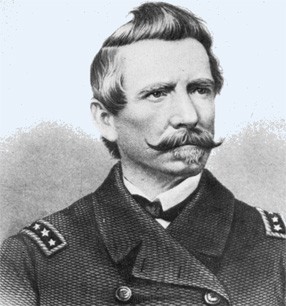 Klaus GRÖBIG:
Klaus GRÖBIG:
L’Amiral Raphael Semmes, héros sudiste
Il y a 200 ans naissait celui qui devriendra le “Requin de la Confédération”
Raphael Semmes est né le 27 septembre 1809 à Charles County dans le Maryland, l’Etat de l’Union dont le Parlement, par l’intervention musclée et autoritaire de Lincoln, n’a pas pu décider seul s’il allait ou non rejoindre la Confédération. En 1826, Raphael Semmes s’engage comme matelot dans l’US Navy et, plus tard, lors de la guerre contre le Mexique, il commandera le brick “USS Somers”. En avril 1861, Semmes met un bâtiment en service, pour le compte de la Confédération, le “CSS Sumter”. Il fut l’un des rares officiers de marine expérimentés qui s’engagea pour la cause sudiste. Il devint donc d’abord le capitaine de ce vapeur de commerce, transformé en croiseur, et emporta, avec lui, ses premiers succès, en coulant de nombreux navires de commerce du camp yankee. Finalement, le “CSS Sumter” mobilisa contre lui de nombreux bâtiments de guerre de l’Union, chargés de le repérer; ainsi, Semmes contribua à alléger le blocus des ports de la Confédération. Dans les Caraïbes, devant les côtes du Brésil et à proximité des Açores, Semmes lançait ses opérations avec son croiseur. En avril 1862, il dut voguer vers Gibraltar pour y parfaire des réparations; pendant le trajet, il avait rencontré trois navires de guerre de l’Union, qui entendaient bien couler le “CSS Sumter”. Ils l’attendent devant Gibraltar. En un trourne-main, Semmes vend alors le “CSS Sumter”, fort abîmé, à un armateur anglais, quitte le port de Gibraltar avec tout son équipage et se rend en Angleterre.
Là-bas, le croiseur auxiliaire “CSS Alabama” venait d’être achevé dans un chantier naval: Semmes le met en service le 24 août 1862 à proximité des Açores. L’équipage du nouveau croiseur était constitué d’un mélange bigarré d’Américains et d’Européens. Parmi les vingt-huit officiers du croiseur, il y avait deux sujets prussiens, un Irlandais, trois Britanniques et trois ressortissants d’Etats de l’Union. Les autres officiers venaient tous d’Etats de la Confédération. Dans l’équipage, on comptait également un homme de couleur, ce qui est difficile à faire comprendre aujourd’hui, à tous ceux qui sont prisonniers des schémas inamovibles et intangibles du “politiquement correct”. Les qualités de chef de Semmes étaient hors du commun, de même son charisme personnel. Le 5 septembre 1862, le “CSS Alabama” emporte sa première victoire. Il en remportera au total quatre-vingt contre les bâtiments ennemis (certaines sources disent qu’il n’en a remporté “que” soixante). Le 10 janvier 1863, Semmes est devant la côte du Texas pour tenter d’entamer le blocus yankee: il y rencontre le croiseur “Hatteras” de l’Union et le coule à coups de canon, en tout six coups au-dessus de la ligne de flottaison. Il sauve 118 marins de l’Hatteras, les prend à son bord et met le cap sur la Jamaïque, pour y faire réparer les dégâts encaissés lors du combat. Ensuite, partout, Semmes a laissé sa “carte de visite”: dans l’Atlantique Nord comme dans l’Atlantique Sud, au cap de Bonne Espérance et dans l’Océan Indien. Au printemps 1863, dans l’Atlantique Sud, il forme équipe avec deux croiseurs auxiliaires, les “CSS Florida” et “CSS Georgia”.
Le 11 juin 1864, le “Requin de la Confédération” mouille dans le port normand de Cherbourg. A l’arsenal bien équipé de la marine de guerre française, Semmes espère pouvoir faire exécuter tous les travaux de réparation nécessaires. Il estime que cela durera deux mois. Le sort de la guerre était à ce moment-là très défavorable pour les Sudistes. En Europe, tous escomptaient désormais la victoire de l’Union. Le Président Lincoln adressait des menaces aux Européens qui oseraient encore soutenir la Confédération. Les Français se révélèrent maîtres en matière de diplomatie. Le commandant du port de Cherbourg expliqua à Semmes que les installations du chantier naval étaient la propriété de la marine française et, de ce fait, réservées exclusivement aux navires de guerre français. Mais, ajouta-t-il, au Havre, il y avait un chantier naval privé, avec cale sèche, où il pouvait faire exécuter les travaux nécessaires. En attendant, le Capitaine John A. Winslows, du croiseur “USS Kearsarge”, venait d’arriver devant les côtes françaises. Le dimanche 19 juin 1864, très tôt le matin, le “CSS Alabama” quitte Cherbourg à toute vapeur. Le combat se termina en faveur des Nordistes et le “CSS Alabama” fut coulé. Au grand dam des Yankees, un yacht privé britannique, le “Deerhound”, prit à son bord Semmes, blessé, et quelques-uns de ses officiers. Entre-temps, le blocus yankee se faisait de plus en plus hermétique; pour rentrer au pays, Semmes dut faire le détour par un port mexicain.
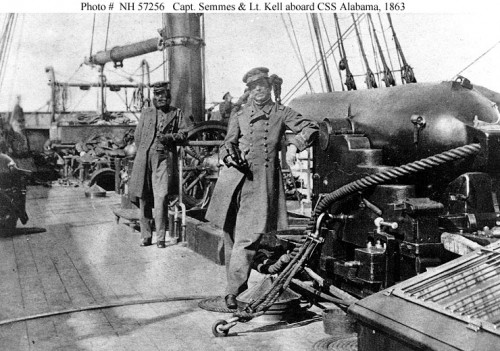
Pour défendre Richmond, la capitale sudiste, on mit sur pied une flotille fluviale. Semmes fut promu amiral et obtint le commandement du “James River Squadron”. Après la chute de Richmond, Semmes fut contraint de couler ses bateaux. Ses matelots sont alors versés dans l’infanterie et Semmes, avec le grade de général de brigade, reçoit la mission de commander ses propres hommes devenus fantassins. Même après la capitulation de l’armée de Virginie du Nord, qui avait été commandée par le Général Lee, Semmes ne déposa pas les armes. Le 30 août 1865, l’armée du Général Joseph E. Johnston doit capituler à Raleigh.
Gideon Wells, le ministre de la marine de l’Union, qui ruminait vengeance, fit arrêter Semmes en décembre 1865. Quelques avocats marron, sous la houlette du Colonel US J. A. Bolles, furent chargés de collationner des faits ou des ragots pour construire de toutes pièces une accusation de “crime de guerre”. Mais rien de ce genre ne pouvait être reproché à Semmes. La volonté de fabriquer de tels “procès” démontre que la guerre civile américaine était, sur ce chapitre, une guerre bien “moderne”, car les crimes flagrants des Yankees, comme par exemple la marche en avant de Sherman, qui ravagea tout en Géorgie, n’a jamais fait l’objet d’une “enquête” similaire. Semmes eut toutefois plus de chance que d’autres généraux de la Confédération. Il fut libéré assez rapidement, devint professeur et connut le succès économique comme éditeur de journaux.
Semmes meurt le 30 août 1877. Il venait de rendre visite à sa fille, chez qui il avait mangé des scampis gâtés. Les médecins sont arrivés trop tard pour enrayer l’intoxication alimentaire. Semmes fut enterré dans le cimetière catholique de Mobile en Alabama, situé dans la Government Street, à côté de son épouse. On peut encore se recueillir sur sa tombe aujourd’hui.
Klaus GRÖBIG.
(article paru dans “zur Zeit”, Vienne, n°40/2009; trad. franç. : Robert Steuckers).
Pour en savoir plus:
Lire le cahier n°146 de la série “Schiffe – Menschen – Schicksale” (= “Navire – Hommes – Destins”) qui paraît chez l’éditeur Rudolf Stade, à Kiel.
(ndt) : Ajoutons aussi l’excellente notive biographique sur Raphael Semmes dans Helmut Pemsel, “Biographisches Lexikon zur Seekriegsgeschichte”, Bernard & Graefe Verlag, Koblenz, 1985.
En français:
Se référer à l’ouvrage d’Indro Montanelli et Mario Cervi, “Les guerres américaines – la Sécession”, Ed. Atlas, Paris, 1985 (traduction française: Philippe Conrad); cf. le chapitre intitulé “Corsaires et sous-marins”, pp. 123 et ss.; lire également, Dominique Venner, “Gettysburg”, Ed. du Rocher, Paris, 1995; plus particulièrement: le chapitre intitulé “Une armée et une marine surgies de rien”, pp. 93 à 111.
00:10 Publié dans Histoire | Lien permanent | Commentaires (0) | Tags : histoire, etats-unis, confédérés, guerre de sécession, marines de guerre |  |
|  del.icio.us |
del.icio.us |  |
|  Digg |
Digg | ![]() Facebook
Facebook


